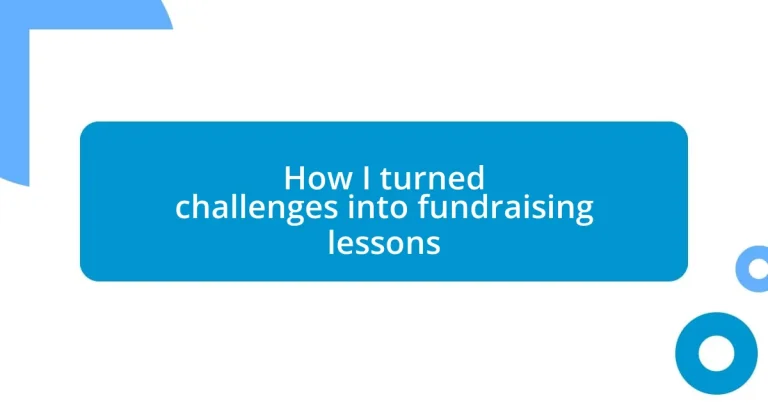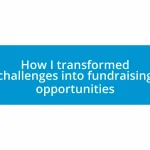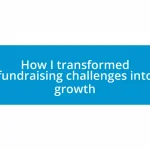Key takeaways:
- Understanding donor objections, such as budget constraints and impact uncertainty, is crucial for effective fundraising communication.
- Learning from failed campaigns emphasizes the importance of emotional connection, audience alignment, and transparency in building trust.
- Collaboration and resilience can transform setbacks into opportunities, leading to innovative strategies and community engagement.
- Continuous reflection and feedback from supporters can refine messaging and improve fundraising effectiveness over time.
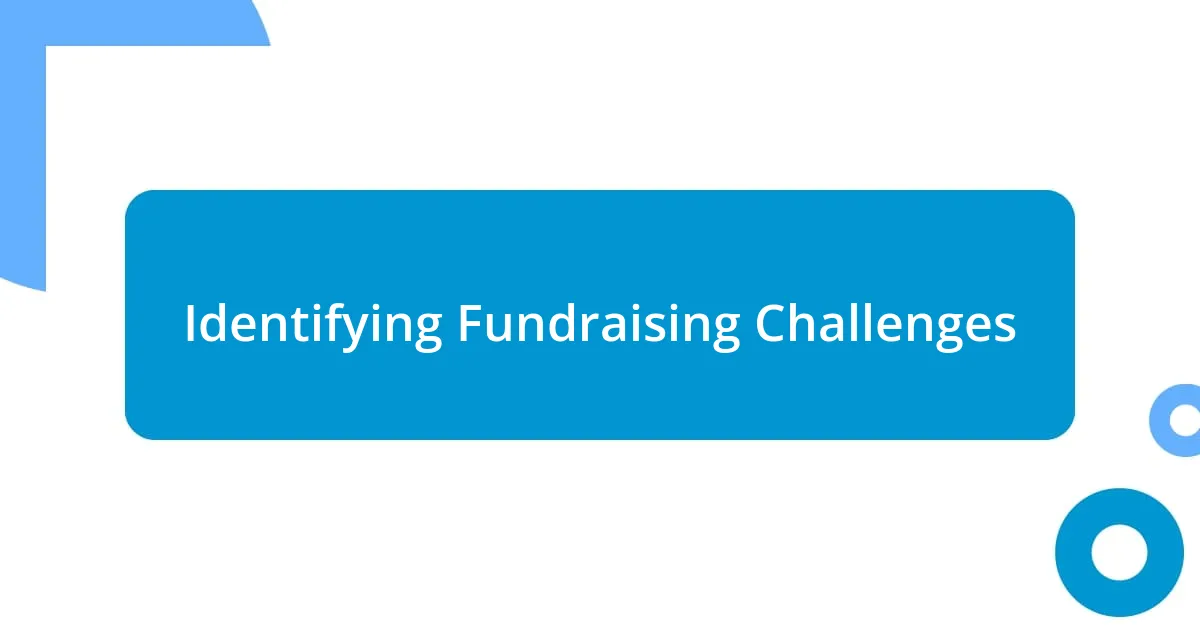
Identifying Fundraising Challenges
Identifying fundraising challenges can feel overwhelming, especially when your efforts don’t seem to yield the expected results. I remember one campaign where I had high hopes but faced unexpected donor fatigue. Why did that happen? It’s crucial to assess the external factors influencing your fundraising efforts, such as economic conditions or changes in community interests.
One vivid memory comes to mind from a silent auction I organized. We poured so much energy into curating unique items, yet the turnout was disheartening. This experience starkly highlighted the importance of understanding your audience and their priorities. Are you truly connecting with them, or are you missing the mark?
Reflecting on my journey, I’ve also encountered challenges in team dynamics and logistics that disrupted fundraising flows. There were moments when communication broke down, leading to frustration and misalignment of goals. How do we prevent that? I learned that clear plans and roles not only help identify challenges early on but also foster a collaborative spirit, making the whole process smoother and more enjoyable.
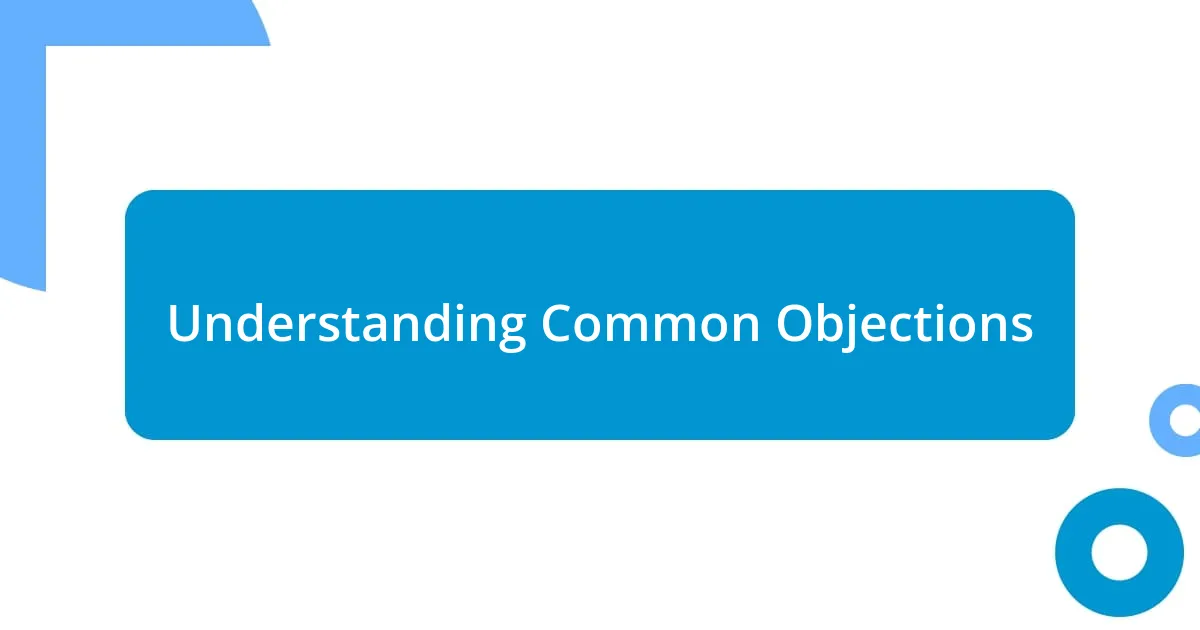
Understanding Common Objections
Understanding objections is an essential part of successful fundraising. When I first started, I often found myself unprepared for the common reasons potential donors might hesitate. One particular instance comes to mind: I approached a local business for sponsorship, only to be met with concerns about budget constraints. This experience taught me to anticipate such objections and be ready with clear, thoughtful responses.
Here are some frequent objections I’ve encountered along the way:
- Budget Limitations: Many potential donors worry about their own financial commitments.
- Uncertainty About Impact: Donors may be skeptical about how their contributions will make a difference.
- Previous Engagements: Sometimes, they have existing commitments that limit their ability to support more causes.
- Misalignment with Mission: Not every organization resonates with every donor, which requires clear communication about your goals.
- Change Fatigue: In times of economic upheaval or crisis, people often hesitate to give due to general anxiety about the future.
Recognizing these objections has made me a more effective communicator. By addressing concerns early, I found that I could build trust, showing donors that I understand their perspectives and am genuinely invested in creating a positive impact together.
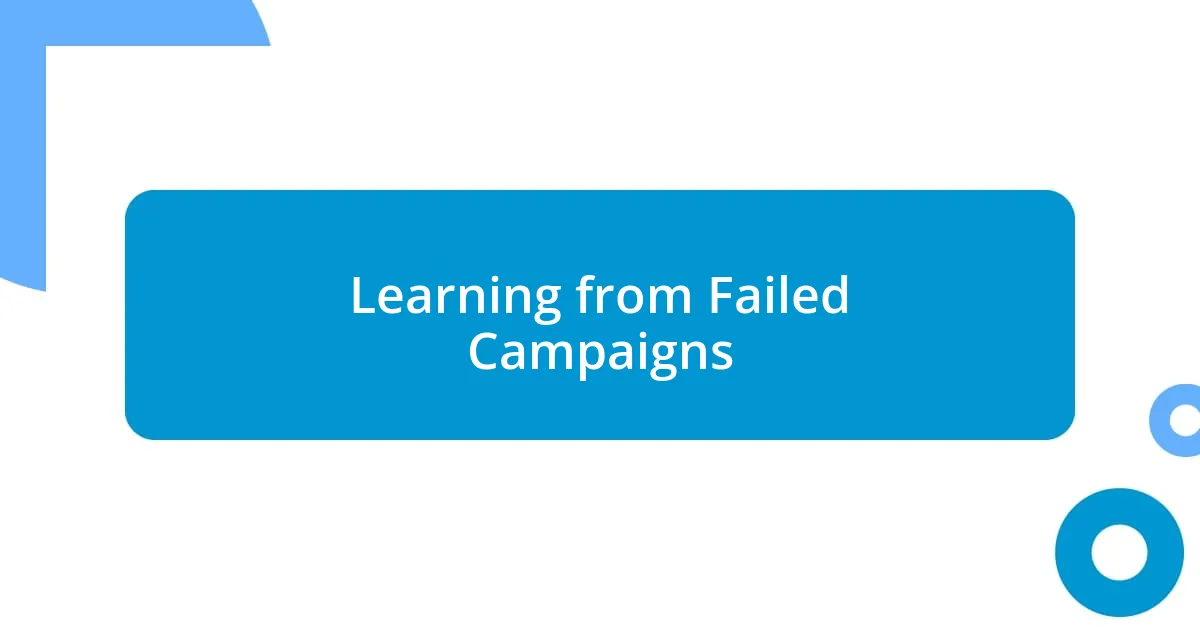
Learning from Failed Campaigns
When reflecting on my failed fundraising campaigns, the lessons learned often overshadow the disappointments. I recall a crowdfunding initiative that seemed to falter from the start. I was so focused on the platform’s features that I neglected essential aspects like storytelling and emotional connection. This experience emphasized to me that effective fundraising isn’t merely about the campaign structure; it’s about touching hearts and sparking interest. Have you ever faced a moment where you realized the emotional element was missing from your messaging? That epiphany can lead you to adjust your approach for more authenticity and potential success.
Another setback that stands out was a themed gala that didn’t resonate with attendees. We invested a significant amount of energy, only to find that the theme didn’t captivate our target audience. This taught me the importance of aligning event concepts with community interests. I started conducting informal surveys pre-campaign, asking local supporters what they wanted to see. That feedback loop not only improved community involvement but transformed my fundraising strategy. Have you asked your audience what they truly value lately?
Finally, I’ve been reminded repeatedly that transparency fosters trust. In one campaign, a lack of clarity about fund allocation led to doubts among my supporters. I learned that sharing not just success stories, but challenges and setbacks too, nurtures a deeper connection with donors. I now prioritize open communication, ensuring that my supporters feel like genuine partners in our mission. What steps can you take to enhance transparency in your next campaign?
| Failed Campaign Experience | Lesson Learned |
|---|---|
| Crowdfunding Initiative | The importance of emotional connection in storytelling. |
| Themed Gala | Aligning events with audience interests through feedback. |
| Lack of Transparency | Building trust with donors through open communication. |
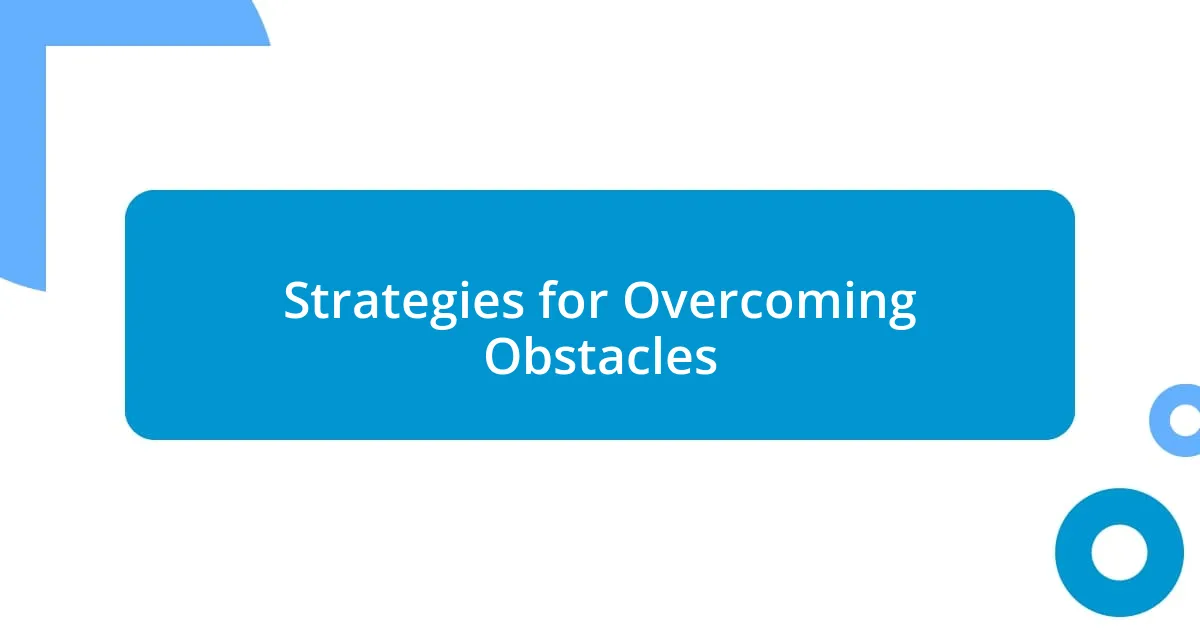
Strategies for Overcoming Obstacles
Sometimes, the best strategy to overcome obstacles in fundraising is to foster collaboration. I remember a frustrating moment when I struggled to secure partnerships for a campaign. Instead of pushing my agenda, I decided to invite prospective partners to a brainstorming session. This open dialogue not only formed a bond but also sparked creative ideas that we could all rally behind. Have you ever considered co-creating your campaigns with others who share your passion?
Embracing a mindset of resilience is another powerful strategy. I once faced a significant setback when an unexpected event caused our main sponsor to withdraw. Instead of wallowing in disappointment, I shifted my focus to what we could control. I rallied my team, harnessed our collective energy, and within a few weeks, we hosted a successful virtual event that exceeded our initial goals. It’s amazing how a change in perspective can turn a daunting challenge into an opportunity, isn’t it?
Lastly, regular self-reflection can illuminate paths forward. I often carve out time after each campaign to evaluate what worked and what didn’t. One particular review revealed that I was neglecting follow-ups with donors. Once I made it a habit to reconnect and express genuine gratitude, not only did donor retention improve, but I also noticed an uptick in unsolicited donations. How often do you take a step back to assess your own practices and make thoughtful adjustments?
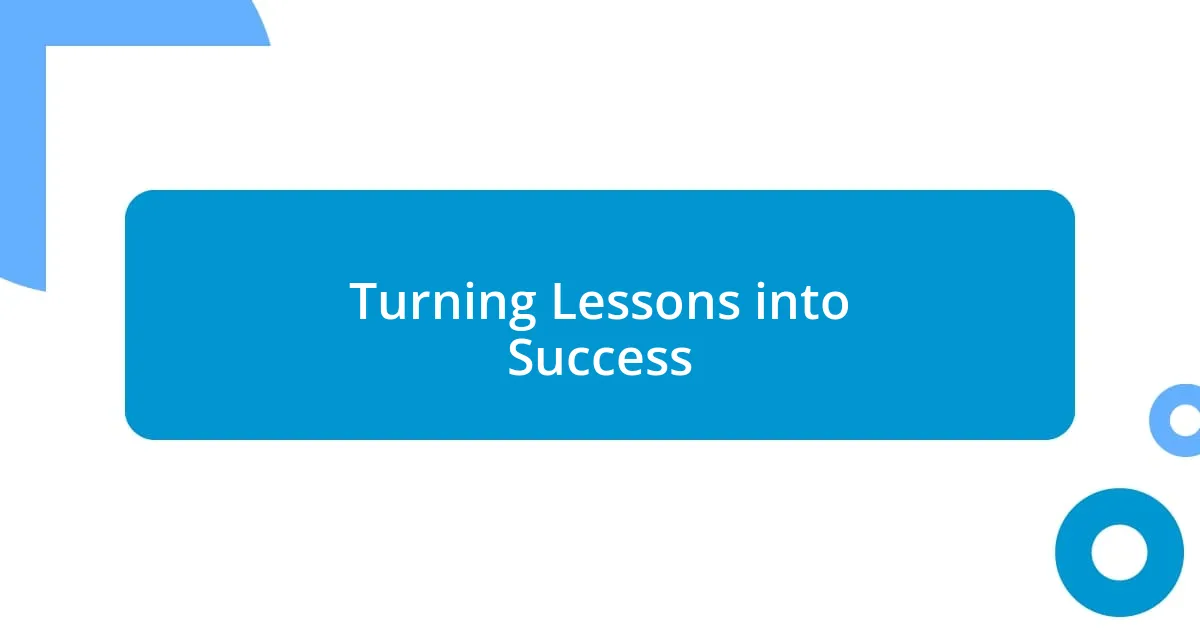
Turning Lessons into Success
Reflecting on how I turned challenges into success in fundraising, I find that every experience shaped new strategies. For example, there was a time when I organized a community event, but we fell short on attendance. Instead of being discouraged, I decided to engage directly with attendees afterward, asking them what they would want from future events. It was a real eye-opener! Understanding their needs helped me reinvent my approach, resulting in a turnout that exceeded my expectations the following year. How often do you reach out for feedback after an event to truly grasp your audience’s desires?
Another pivotal lesson came from a fundraising competition I entered, only to come in last place. Initially, it stung, but I dove deep into why that happened. I realized my promotional strategy was too one-dimensional. I shifted my focus to using social media creatively, inviting followers into the conversation and letting them share their personal stories. This not only garnered support but built a genuine community around our cause. Have you considered how bringing your audience into the narrative could enhance your fundraising appeal?
In moments of trial, the significance of adaptability became crystal clear to me. During one campaign, a sudden change in legislation threatened our funding sources. Instead of panicking, we reassessed our objectives and shifted our messaging to what we could still offer. This pivot not only kept our current supporters engaged but attracted new ones who were inspired by our determination. Have you ever found that adaptability was your greatest ally in tough situations? Embracing change can truly open doors to unforeseen opportunities.
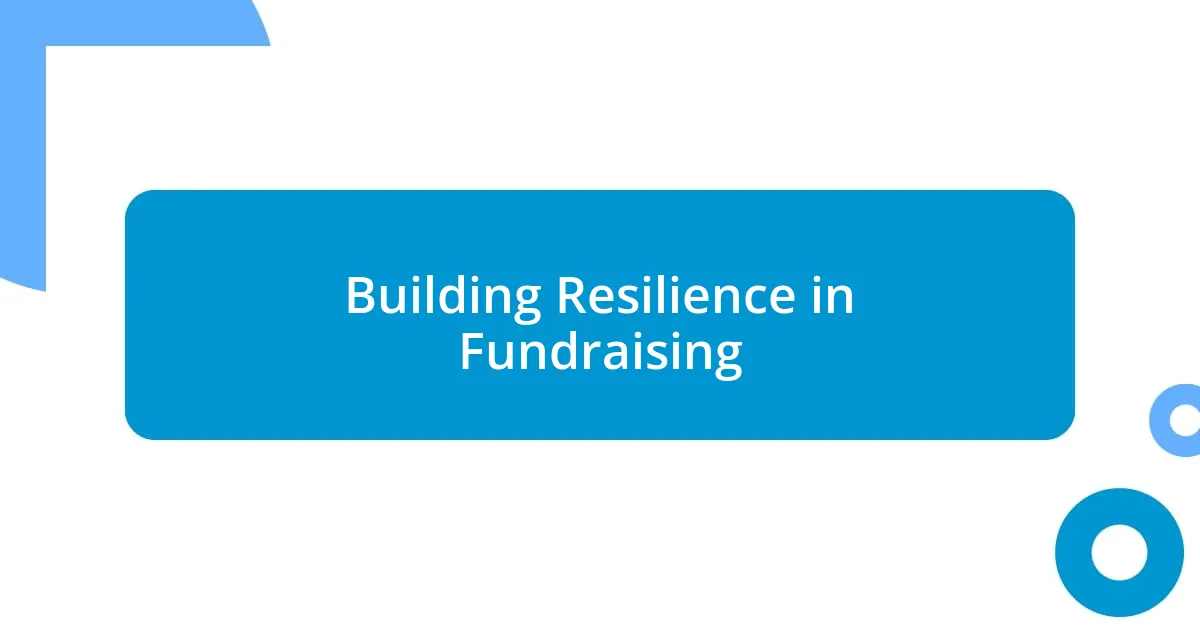
Building Resilience in Fundraising
Building resilience in fundraising often hinges on the power of perspective. I remember when my team and I faced a major challenge during a capital campaign—it felt like we were driving through thick fog with no clear sight ahead. By reframing the situation, we viewed this uncertainty as an opportunity to connect deeply with our community rather than just a hurdle. That shift made all the difference; we invited feedback from stakeholders, turning our ambiguity into actionable insights.
An essential component of resilience is nurturing a supportive culture among your team. There was a time when a project fell short of its fundraising goal, and I noticed a palpable air of disappointment. Instead of letting that negativity fester, I called for a team huddle where everyone could openly express their feelings. It was surprising how sharing those emotions built camaraderie and sparked fresh ideas. Have you created a safe space for your team to acknowledge setbacks and brainstorm solutions together?
Learning to embrace setbacks can transform them into critical learning experiences. For instance, during a particularly challenging year, I faced rejections from multiple potential sponsors. Initially, I felt defeated, but I took it as an invitation to re-evaluate our value proposition. After a few soul-searching weeks, I updated our messaging to highlight not just what we do, but why it matters. This newfound clarity attracted support from unexpected quarters. Isn’t it fascinating how reframing our narrative can lead to unforeseen opportunities?
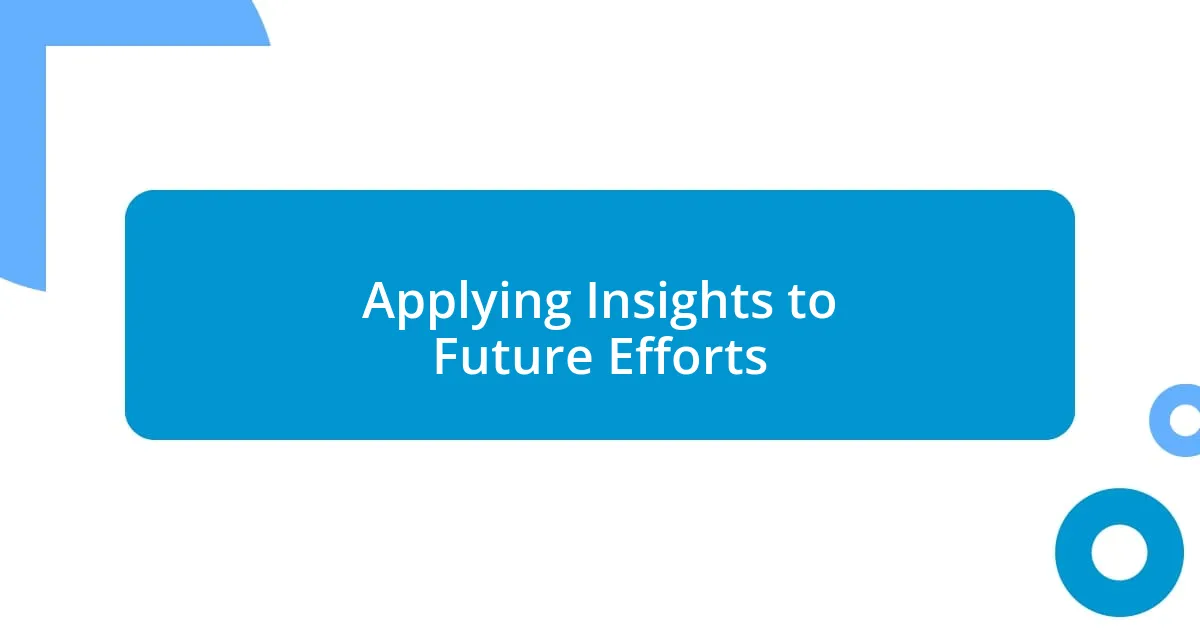
Applying Insights to Future Efforts
Reflecting on past experiences, I often find that the real takeaway lies in how we apply what we’ve learned. For instance, after a campaign that fell short of its funding goals, I took time to analyze what went wrong. Rather than viewing it as a total failure, I recognized it as a moment to refine my messaging and outreach strategies for the next effort. Can you remember a time when a setback pushed you to rethink your approach?
This journey of growth doesn’t just stop at self-reflection; it extends to the way we engage our supporters. I remember shifting focus after realizing that our previous methods didn’t resonate well with our audience. By holding intimate focus groups, I learned what their motivations were. This direct engagement revamped our future fundraising efforts and they were not only more successful but also sparked a sense of ownership among our supporters. Have you ever reached out to your audience directly to learn what truly matters to them?
Moreover, I firmly believe in the value of continuous learning. Each obstacle I’ve faced has opened my eyes to new possibilities. For example, when a particular fundraising method proved ineffective, I didn’t shy away from experimentation. Instead, I conducted a small-scale trial of different approaches, which ultimately revealed untapped channels in our strategy. This adaptability led to a refreshing turnaround in support and outreach. What experiments have you conducted in your fundraising efforts that led to unexpected success?












